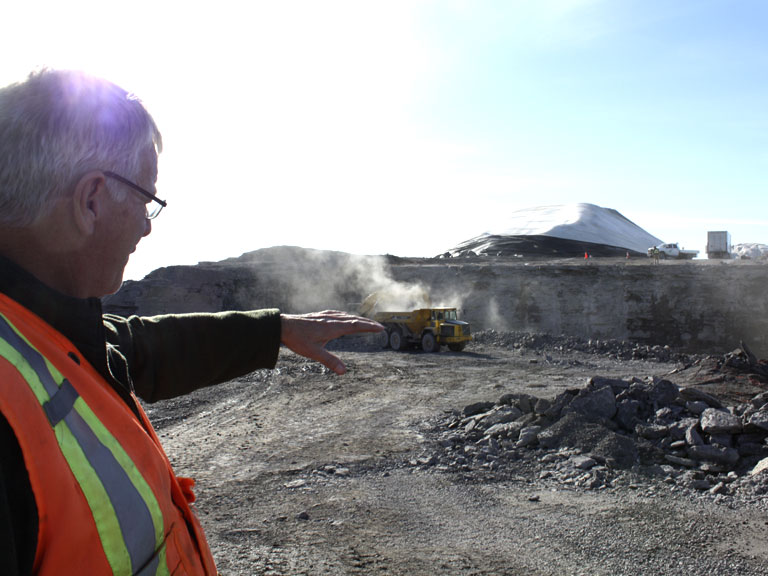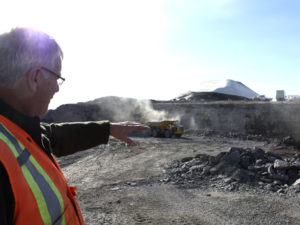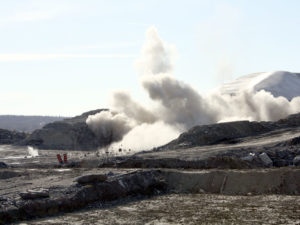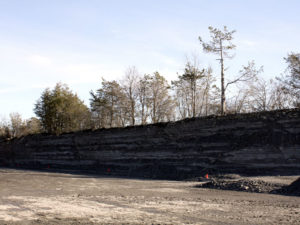County News
Terminal town

Update: Picton Terminals has been ordered by the Ministry of Environment and Climate Change to cover the salt piles by no later than Friday, November 24, 2017
The report can be found by clicking here.
Picton Terminals says it is working hard to rehabilitate old port facility to meet modern standards
When the Doornekamp family decided to buy a port in Picton, they likely had little idea the kind of media attention they would receive in this community. It started out well enough— with politicians and business leaders praising the investment in Prince Edward County.
But since then, the tone of the media coverage has declined steadily. Initially when the company blasted away the cliff to make way for an expanded loading area, then piled the rock into black berm around the perimeter of the property, or when a load of petcoke, stored on the property was blown onto neighbouring houses and yards, the Doornekamps moved quickly to clean up their mess. But the public relations challenge was just beginning. Since then, Picton Terminals has been frequently in the headlines—for the wrong reasons.

Hank Doornekamp points to an area of rock about to be blasted.
Picton Terminals has been under constant scrutiny from concerned neighbours, local conservation authorities and provincial and federal regulators. The facility made national news for two incidents this year. The first was the sinking of a barge moored at the terminal that forced Picton’s water system to be shut down due to the resulting pollution of the bay. Later, a federal regulatory body was sent to investigate whether the Fisheries Act has been violated by the stormwater pollution flowing from the Port.
The Doornekamps say they responded effectively and speedily to both incidents—that both stories were overblown in the press. They say the barge issue was cleaned up quickly. Salt flowing into the bay continues to be a challenge.
But Ben Doornekamp says some points need to be clarified. He says Picton Terminals is not compelled by regulation to cover the salt piles. They do so because they have an agreement with their salt distributor that they cannot lose more than three per cent of their product. A recent in-house test was done by the terminal and according to Doornekamp, of the over 120,000 tonnes brought into terminal, there was only 3.5 tonnes missing from scale in to scale out. That would put the spillage of salt into the bay at .05 per cent of the total product.
“Archimedes’ principle governs what comes in and out of the terminal,” said Doornekamp. “Everything that does come through is highly regulated and controlled. There are so many checks and balances in our business.”
The other point that needs some clarification, according to Doornekamp, is that the terminal is currently designated as a quarry and not a port. The terminal lost its port designation in 2007 and the Doornekamps want to get that designation back. Currently the port is being operated under “legal non-compliance”, which in plain language, means that the terminal may continue to act as a port because its use pre-dates its zoning—or until a governing body intervenes.
Doornekamp says he and his family are extremely conscious of the environment of this facility and he is proud of the environmental stewardship and track record demonstrated on the family’s many other projects.
But he stresses that Picton Terminals is a work in progress and that everything can’t be solved right away. He says his family purchased a dilapidated port facility that had fallen into disrepair and disuse. Doornekamp speaks enthusiastically about restoring the facility and doing the things necessary to ensure they are good neighbours and with a low impact on the environment and the bay. He believes he can do this and create a vibrant new economic hub for the community.
But there have been recent concerns raised by neighbours and the action committee Save Picton Bay that centres on a large hole being excavated on the eastern edge of the property.

A controlled blast on the quarry site at Picton Terminal.
The “live load bin” at the terminal is a massive open pit that extends roughly three stories underground. Flatrock gravel is currently being piled high in one of the corners. Doornekamp explains that this is the same live load bin that the iron/ore company used to ship out their product in the ’50s. Trains would come from the Marmora mine through Wellington to Picton right to the edge of the live load bin and dump out from the bottom of the car. For 25 years Picton Terminals ran 50 laker loads of iron ore a year, according to Doornekamp.
He adds that a series of retention pools have been created to hold the runoff of the salt piles, which is one step in keeping the water from entering Picton Bay.
“As soon as there was a concern we added more retention pools and began the process of finding a permanent solution for the salt problem,” said Doornekamp. “We have reacted immediately to every request and demand put upon us, but we can’t do everything at once. There needs to be some compromise from all parties. I’ve been in business long enough to know that if all parties work towards a compromise situation, then everyone gains in the long run.”
On the quarry side, Doornekamp explains how both processes work in regards to grinding versus blasting rock. Both methods are not quiet, but the consensus from the neighbours, according to Doornekamp, is that the grinding was too noisy and lasted a lot longer. The blasting is intense for a moment and then its gone.
This correspondent witnessed one such blast. It was intense, and the sound concussion was felt more than a few hundred metres away. It blew off a massive portion of rock, which was then to be broken down and ground to a finer product by the giant crushers on site. Then the crushed rock is sent over to the live load bin to be shipped off. Boats come in and load up six days a week at the terminal. It’s a busy, hectic site with a lot of moving parts.
Ben Doornekamp is unhappy about the negative press Picton Terminals has received. He believes his family isn’t getting enough credit for the speed, energy and investment they are putting in to fix the problems—many of which pre-date their ownership.
He would rather focus on what the terminal is doing to make the site better. Picton Terminals has submitted a project for approval by the MOECC. It is a dry storage area for salt and, if approved, it would be a first on the Great Lakes for road salt storage and shipping. The storage would ensure that all salt handling operations will be done within the dry, covered structure. This application was done in conjunction with engineers from the MOECC, who have been working closely with the terminal on the project.
Neighbours of this facility will need more than words. Many have lost faith in the Doornekamps’ ability to operate Picton Terminals without causing more environmental damage.

An example of the grinding process in which rock is extracted from the ground.
“It is difficult to have confidence in Picton Terminals’ ability to operate without causing more environmental issues given their history over the last year,” said David Sutherland, spokesperson for Save Picton Bay. “We have raised concerns in the past about the potential for frequent large ship traffic to disturb the bottom sediments of Picton Bay, which contain arsenic and mercury.”
Save Picton Bay has also raised concerns that the proposal for a dry storage site will not go through due to the current legal non-conforming zoning. Proper zoning could take a while, and put completion of the project into 2019. In the meantime, Save Picton Bay will continue to raise concerns on the proper storage of salt at the terminal until they are convinced that Picton Bay is not being harmed.
With more eyes on the terminal than ever before, the Doornekamp family has a tough job ahead of them. Once trust has diminished it is difficult to restore. But the Doornekamps say they remain focused on restoring this facility, cleaning up the environmental issues and creating a vibrant transportation hub in Prince Edward County.
“Picton has always been a terminal town,” said Doornekamp. “People sometimes forget that. This port is vital to how our community functions.”

When writing a piece and you happen to have corroborative information, it might prove wise to read it first. This way you would know if the interviewee is blowing smoke or not. There is a big difference between what Ben said 3.5 T in the interview and what the MOECC said 58,000 + T in their report, especially when the MOECC information came from Ben Doornekamp.
Doorenkamp along with most other operations in this so called tourists area will only ever get negative media coverage tourists only is all that seems important or matters what about the rest of us locals
3.5 tonnes of salt flowing into Picton Bay is NOT insignificant. “Compromise” on this is not an option. Finally the MOECC is doing its job ordering that the salt be covered.